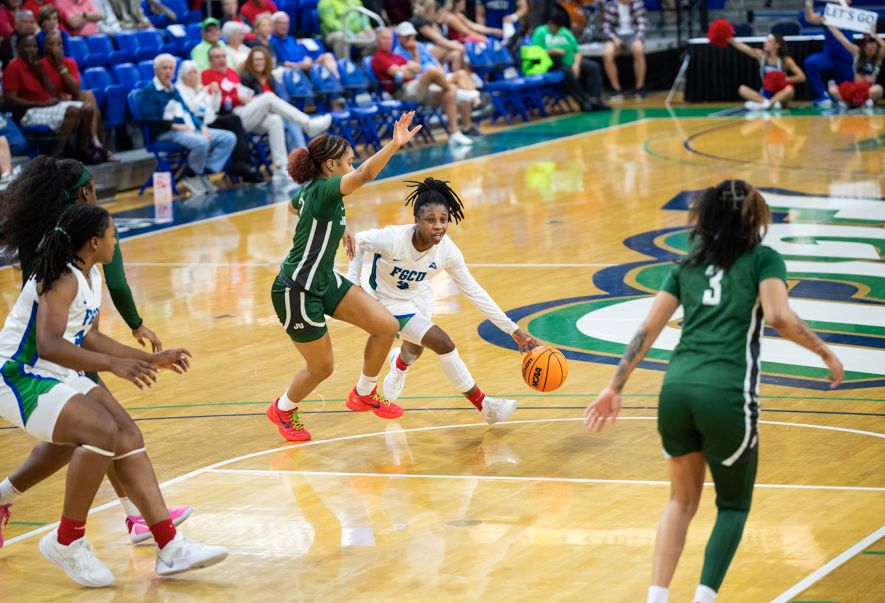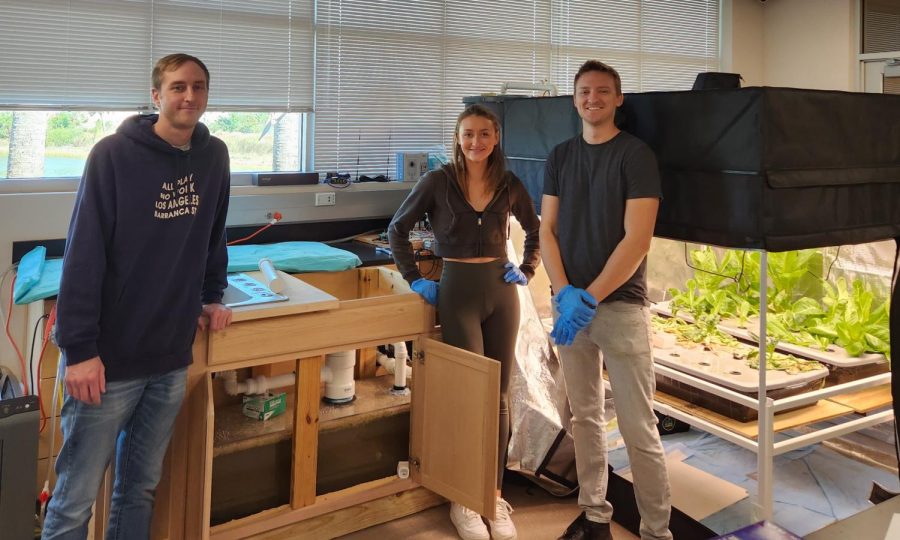Water-Energy-Food Nexus Project Reduces Campus Dining Food Waste
U.A. Whitaker College of Engineering undergraduate researchers Trent Rogalski, Gabriel Alford and Terence Wise working on the Water-Energy-Food Nexus Project. Photo courtesy of Terence Wise
April 28, 2023
Food scraps are being turned into fertilizer and energy for local homes through the Water-Energy-Food Nexus Project.
The project was created by Seneshaw Tsegaye, an FGCU environmental and civil engineering professor. Tsegaye says food waste is disposed of at landfills where it occupies a lot of space and contaminates soil, air and water.
This is where his project comes in to use the waste for another purpose — as a resource. An important element to the project and its accessibility is because of campus entities aiding each other.
“Most of the U.S., even now, 30-40% of the food waste goes to landfills,” Tsegaye said. “Since we are wasting a lot of food waste especially in the U.S., there must be a way to capture that food waste and create some product.”
Tsegaye says the project uses food waste given to him from Dining Services to operate the project. The scraps are turned into a biogas energy source and a nutrient-rich liquid to grow plants.
Using this waste before it ends up in landfills is important to Tsegaye since it’s a wasted energy source and could help reduce pollution.
This product would go on to produce different products which would come back as waste. The waste is then reused and would become a product again. Tsegaye says this idea of a closed-loop system is sustainable.
“The food waste would be used to produce energy, but also the fertilizer that is coming out of the system would be used to produce food,” Tsegaye said. “It is a closed-loop system, and nothing is going to waste in that system. Everything is a resource.”
To test the project, Tsegaye asked FGCU’s Dining Services for help.
Tara Scrivano, the resident district manager for FGCU’s Dining Services, said the project is given 10 pounds of food waste a week. In the 2022 fall semester, she said the project was given 100 pounds in total.
“Our responsibility is to help mitigate waste hitting the landfill in any way we can do that, and partnering with a department on campus is absolutely a win-win,” Scrivano said.
Dining Services giving food scraps to the project and the nature of the project itself allow for a more sustainable focus. However, accessibility is also an important factor.
The project has had faculty from across campus, including engineering students, become interested. Tsegaye said that students help by working with the project and helping collect the food waste from Dining Services.
Scrivano says aiding the project is a major benefit for students involved.
“We know and we recognize that we are a dining program in an institutional environment, and we think it’s important because the students are getting more hands-on experience out of their curriculum,” Scrivano said.
Scrivano says if future opportunities with FGCU entities to promote learning arise, that Dining Services would want to partner to help students learn.
Tsegaye says accessibility is an important factor with how the project came about.
“This technology is not a new approach,” Tsegaye said. “There has been a variety of people who use food waste to produce biogas. But the biggest challenge with that is that most of the technology that we have at the moment is on a bigger scale like community- or city-scaled systems that can convert food waste or any other waste, for that matter, to produce energy.”
Tsegaye says there are different issues with accessibility.
“The problem with that is accessibility,” Tsegaye said. “The other one is people engaging in individual communities to have the initiative to reduce food waste, but also to know that there is food waste to be recycled to produce product. So that doesn’t happen, and it doesn’t happen in most places.”
For the technology to reach out to more people, Tsegaye designed the project with his team members a certain way. He said the project “is basically tailored for a household.”
“So, we were thinking, ‘Is it possible to put together a system that actually helps people or individuals, the household in this case, to convert their own food waste or other waste, for that matter, into energy and fertilizer,’” Tsegaye said.
Tsegaye credits the current progress of the project to Dining Services. He said without the help or food scraps, the project would not be as far along as it is.
“Dining is a critical part of the project,” Tsegaye said. “Without food waste, the biogas reactor that we have doesn’t mean anything. So, that’s like the input source for everything that we do.”
Tsegaye says he and the project’s members are currently discussing whether to obtain a provisional patent for the project.

























Christopher Wise • Oct 5, 2023 at 7:35 pm
Outstanding article! Congratulations!